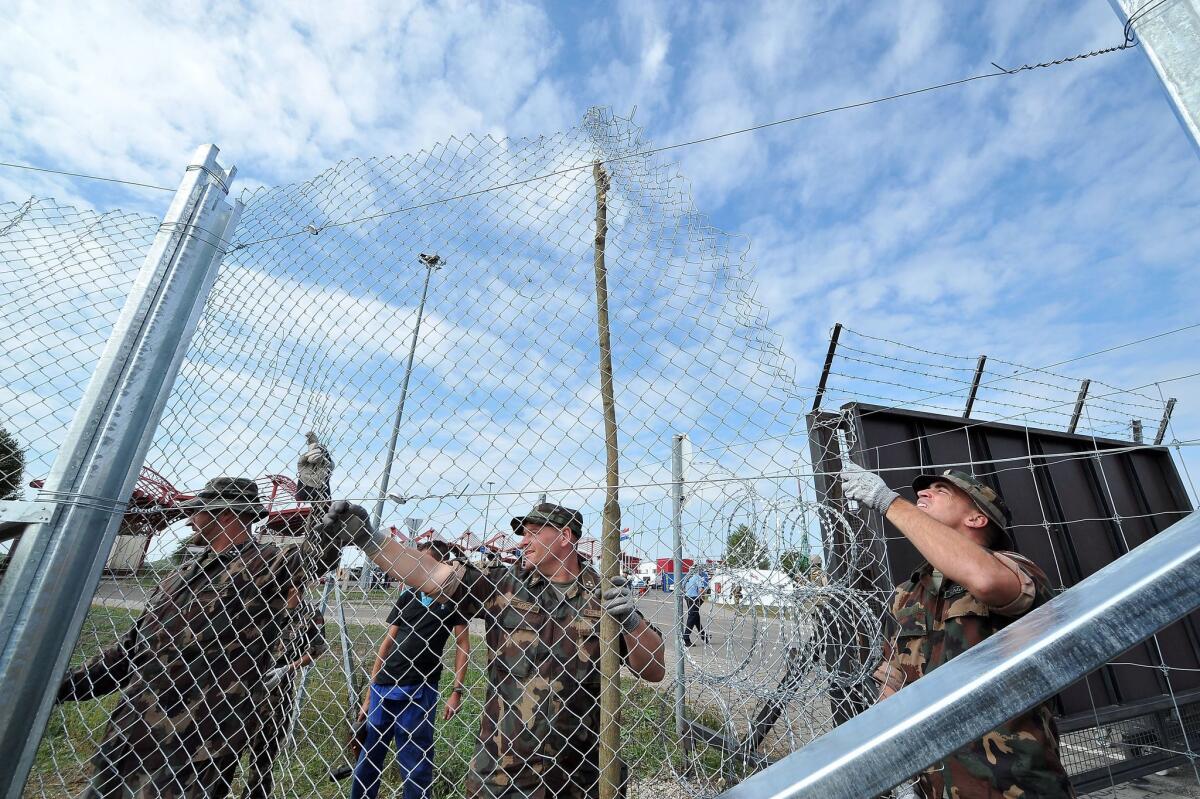Op-Ed: In dealing with refugees, Hungary’s dark past resurfaces

Hungarian soldiers raise fences at the Croatian-Hungarian border crossing between the villages of Baranjsko Petrovo Selo, Croatia, and Beremend, Hungary, on Sept. 22.
- Share via
When I saw the images of Hungarian police spraying crowds of Syrian migrants with water cannons, and the razor wire border fence, and the thousands of people packed inside trains like cattle at the Keleti station in Budapest, and when I heard the Hungarian prime minister say that his aim is “to keep Europe Christian,” I was horrified but not surprised.
In 2010, my family lived for five months in Hungary. I was there on a Fulbright teaching Southern American literature at the University of Pecs while researching my Jewish Hungarian relatives for a book. Before we left, a Hungarian friend in the United States warned me that Hungary was not a very welcoming country. Hungarians like Hungarians. That’s it.
Since Prime Minister Viktor Orban was elected, the government has leaned further to the right.
My research subjects — my Jewish relatives — would have agreed. In 1944, Arrow Cross soldiers rounded up about 424,000 Jewish Hungarians, loaded them on trains and sent them to concentration camps. Most of my mother’s family were among those murdered.
Pecs sits in southern Hungary about 40 miles from the Croatian and Serbian borders. Because we dealt routinely with Soviet-style bureaucracy and the sort of skepticism and anti-Semitism my ancestors experienced all their lives, the city felt like a parallel universe, or one stuck in a dark past.
Between teaching and researching, I made frequent trips to the Immigration and Naturalization office to reassure the government that we were not staying in the country permanently and that we had enough money to leave.
At one point, they requested my marriage certificate — the original, not a copy. I could not provide the original. I told them it was destroyed in Hurricane Katrina, but they still insisted on the original, and I kept returning to complete another round of paperwork. I became increasingly paranoid and convinced they wanted to determine whether I was Jewish or Christian.
While in Pecs, I discovered that my great-great-grandfather had built the city’s synagogue. I spent several afternoons there, sitting in the pews where my ancestors had worshiped. Once, I pulled down the wooden shelf in front of me and found German-language graffiti scratched into the wood: Aus juden seife sieden. Roughly translated: Boil soap out of Jews. It looked recent.
During our stay, the rising political power, the Jobbik Party, frequently organized anti-Semitic demonstrations in Budapest, defacing the few remaining synagogues. Some Jobbiks have ties to the former Arrow Cross Party, the Hungarian version of the Nazis. Since Prime Minister Viktor Orban was elected, the government has leaned further to the right, which is to say it is looking more toward the east than the West; more toward Russia and the “old ways” and less toward the United States and democracy. Democracy is just too much work and Hungarians are all too tired.
But I shouldn’t generalize. My students at the university were thoughtful and intelligent. They gave me directions to Jewish cemeteries, most of which had been destroyed in World War II. These students told me they understood Southern literature because they had lived through communism and endless occupations, and knew the meaning of loss, hardship and survival.
The Hungarian friends we made in 2010 still email us with news and opinions. Some say the fence-building business is “a madness” and they are ashamed of their government. They are frightened, too, because they don’t know what such hatred might trigger. The political and economic situation gets worse every day. My best friend in Hungary says she’s happy that her sons are in graduate school in countries where “people’s minds are not so much infected.”
I used to loathe Hungary for what it did to my mother’s family. Now I find myself defending not Hungary but individual Hungarians: the friends we made, the students I taught. I get defensive about them, just as I used to get defensive about being from Mississippi. “They’re not all bad,” I say, like Quentin in Faulkner’s “Absalom, Absalom!”
“I don’t hate the South I don’t I don’t,” was Quentin’s dubious refrain. Now mine is: I don’t hate Hungary I don’t I don’t.
Margaret McMullan is the author of seven novels. She recently completed a book about Hungary.
Follow the Opinion section on Twitter @latimesopinion and Facebook
More to Read
A cure for the common opinion
Get thought-provoking perspectives with our weekly newsletter.
You may occasionally receive promotional content from the Los Angeles Times.










